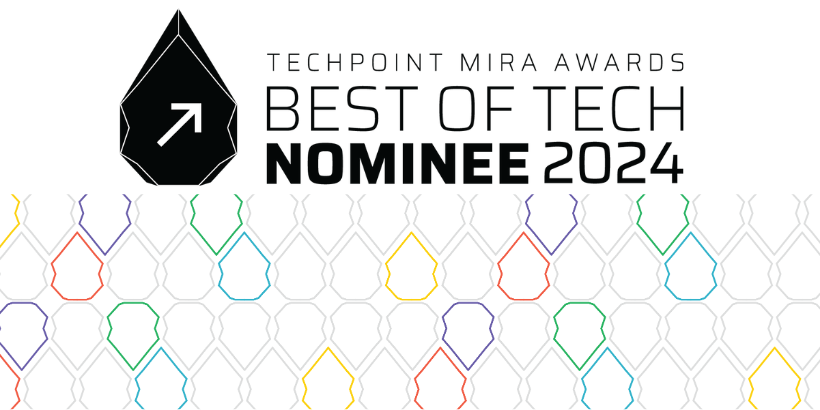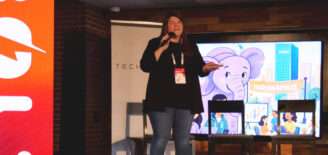Community Impact of the Year Nominees Are Making a Better Tomorrow for Hoosiers Through Programs in All Pockets of the State
The Indiana tech ecosystem is more than a collection of technology and tech-enabled companies. It includes organizations that work to create a brighter, more equitable future for all Hoosiers. As such, they help pull our community together and forward. The Community Impact of the Year award is one that brings Mira Awards attendees to their feet every year, honoring those who look beyond today to a better tomorrow.
Last year’s winner, Indy Women in Tech (IWiT), for example, focuses on helping young girls and women enter tech careers. The women participating in IWiT pathways see a 68 percent increase in their personal income and 89 percent of them graduate on time and with zero debt.
The group of mission-driven champions in line for this prestigious award in 2024 focus on helping people of color, veterans and young people understand and take their rightful place in the tech ecosystem; help entrepreneurs find the support needed to go from concept to market; and are actively helping make their communities more vibrant, inclusive and tech-savvy.
The summaries below of each organization’s performance just skim the surface of what led to their nominations but will give you a glimpse into why their entries were elevated to nomination status. We invite you to learn more about them and find ways to support their selfless missions.
The nominees are:
Ivy Tech Community College, Indianapolis: The Ivy+ IT Academy is the first large-scale Indiana statewide training initiative for IT skills in Indiana. Partnering with Google and Jobs for the Future (JFF) the Ivy+ IT Academy provided more than 1,000 free Google IT certification training courses for Hoosiers in high demand, high wage areas like IT Support, Data Analytics, Digital Marketing, Project Management, and UX Design. Too many Hoosiers mistakenly feel that because they did not major in Computer Science or Engineering and earn four-year-degrees, IT careers are not possible for them. The Academy makes it easy to get the skills needed to keep up and then get ahead. Students can earn accelerated skills training certificates through the Academy’s regular classes and intense summer boot camps—some as quick as a few weeks or months. All training is designed to quickly give students the skills they need to enter and succeed in Indiana’s tech industry. The Academy provides accelerated, flexible, and industry-leading training across the state for current IT Professionals, Career Changers, Current or Recent High School Students and Indiana employers who need to upskill their workers. A partnership with Jobs For the Future enables free certification offerings Google Career Certificate courses in cybersecurity, Data Analytics, Digital Marketing & E-Commerce, IT Support, Project Management and UX Design. Courses are completely virtual and self-paced through the Coursera learning platform, with on-site support from instructors and other Google learners. The programs can be completed in as little as 3-6 months when dedicating under 10 hours of flexible study per week.
JobWorks, Inc., Fort Wayne: JobWorks’ Education & Training Systems (JETS) helps create a more equitable workforce across Indiana by connecting Hoosiers of all backgrounds to the prosperity of a long-term IT career. Communities of color and other underserved groups have historically faced barriers to employment in the tech field. Athe 12-week bootcamp, underrepresented students earn IT credentials and connect to employers hiring entry-level tech talent. Nearly all students attend at no cost. Throughout the instructor-led, live virtual training curriculum, students obtain contextualized, in-demand IT support skills and connect with hiring partners to start their tech careers. Graduates earn the CompTIA IT Fundamentals and CompTIA A+ certifications, learn modern business communication, and creative job search skills. Students meet three days a week for engaging, live virtual training sessions with an instructor. One-on-one tutoring and mindset coaching, study groups, self-paced interactive learning and practice exams are offered the other two days. Students take certification exams during the program and may be eligible for exam retakes. More than 20 partner technology organizations actively source JETS graduates for relevant IT support and technical help desk roles. After the program, students continue to receive on-going, relevant job leads for open IT positions and can attend virtual career fairs. More than 61 percent of students are from underrepresented demographic groups. Nearly 80 percent of all students have graduated, since the boot camps launched in 2019. Nearly 90 percent of graduates earned at least one IT certification. Sixty-five percent are working in tech or adjacent roles earning nearly $20 per hour on average.
Junior Achievement of Central Indiana, Indianapolis: Junior Achievement of Central Indiana’s JA JobSpark is a beacon of innovation, inspiration and inclusivity in Indiana’s tech community. By creating opportunities, breaking barriers, and inspiring the next generation, JACI stands as a true impact maker, driving positive change and shaping a brighter, more equitable future for all. In 2023, JA JobSpark, a flagship initiative of JACI, reached unprecedented heights with a record attendance of 13,300 students—an all-time high that underscores the program’s remarkable impact on the community. This initiative, conceptualized and nurtured locally at the JA location in Indianapolis, has been running annually for nearly nine years, showcasing consistent growth and adoption by hundreds of JA affiliates worldwide. JA JobSpark is a multi-day, hands-on career expo impacting Indianapolis eighth graders. The JA JobSpark initiative includes in-class curriculum and activities prior to and after attending the event. JA JobSpark is meant to “spark” an interest in students and get them excited for their future. Students learn about skills needed for jobs that will be in demand when they graduate and about the equipment that is used on those jobs daily. Students gain a better understanding of the courses they will need to take in high school, a track for post-secondary and a clear career pathway for what they find they are interested in.
Northeast Indiana Innovation Center (NIIC), Fort Wayne: The NIIC is an internationally and nationally lauded business incubator and accelerator and Indiana’s 5th certified technology park, but its leaders realized the organization had been relying on entrepreneurs to walk in their door, which led to underserved demographics being left out. Also, there had been a spike in regional and state Entrepreneurial Support Organizations (ESO) but none were working together to leverage their individual strengths. Entrepreneurs did not know where to go. Foundations did not know who to fund, and communities and government agencies were confused about who to work with. In 2023, NIIC set out correct this, picking six pilot underserved communities to work with and developing a community-centric entrepreneurial support capacity. Organizers engaged with community leaders and economic development drivers to find out what they need and how NIIC could help, developing a common infrastructure of support tailored to each community to reach entrepreneurs and develop trust. NIIC went to great lengths to find out what each was good at, what they wanted to do and what their success metrics were. A detailed set of metrics and a software support portal was developed. More than 1,000 people from all six communities were helped in 2023, and 15 ESOs joined the effort. Technology companies that participated contributed $131 million in economic impact. Greatly enhanced working strategic relationships have been developed with all the major local, regional and state planning organizations.
Mentors of Color, Inc., Fishers: Despite forward strides, the tech industry grapples with persistent challenges of diversity and inclusion, and the shortage of mentors of color presents a profound obstacle that stunts personal and professional growth, limiting the potential of talented individuals who could significantly contribute to the tech industry. The organization leveraged technology to connect mentors of color with mentees in a dynamic and accessible manner. The result was a groundbreaking virtual mentorship program that went beyond the constraints of geographical limitations. By eliminating the need for physical presence, Mentors of Color ensured that mentees had access to mentors who could provide valuable insights and advice, irrespective of their location or network. In 2023, Mentors of Color scheduled 154 matches through their virtual mentorship program. Feedback from mentees was overwhelmingly positive. The program’s ripple effect extends far beyond the scheduled matches. Aspiring individuals found guidance, support, and a sense of belonging in an industry where representation has been historically lacking. The program addresses the immediate problem, sets a precedent for innovative approaches to diversity and inclusion in tech mentorship and fosters a more equitable and dynamic tech landscape.
STARTedUP Foundation, Indianapolis: The STARTedUP Foundation empowers students and teachers to view the world through a lens of innovation and entrepreneurship while building a life of purpose. The Foundation provides free curriculum to Indiana high school students and has engaged more than 6,000 students. The team actively encourages students to reach out to local business and political leaders, and collaborate with their local teacher fellow to tackle real-life challenges. Through its “Indiana Innovation Fellowship,” the team identified 35 teachers from around the Indiana to dedicate time to implement innovation and entrepreneurial thinking into the classroom. They also collaborate with leaders all over the state to ensure its reach is truly statewide and inclusive of rural and inner-city schools to foster innovation and entrepreneurship in places not normally associated with this mission.
City of South Bend: Transportation insecurity is a primary barrier to employment for one in three low-income South Bend residents whose inability to get to work on time (or at all) can have cascading socio-economic impact. Commuters Trust (CT) overcomes this barrier. Launched as a Bloomberg Mayors Challenge winner, CT works with employers to provide transportation as a benefit to South Bend workers. By sharing costs with employers such as Goodwill Industries and the University of Notre Dame, CT has helped reduce employee stress, increase employer/employee satisfaction and improve employment stability for participants, many of whom are part of working families. Rather than building a new infrastructure from the ground up, CT offers free and discounted rides via Uber, Lyft, and Transpo Bus. Participants register through the custom-built CT web app and can redeem their Uber/Lyft voucher or bus pass through the web app portal. Once that is completed, participants can use their rides for eligible trips within St. Joseph County depending on their organization’s restrictions. Because of its reliance on existing infrastructure, this project can be scaled and replicated in multiple markets, and the city is already discussing how to share its proprietary web application and structure with other small city governments. In 2022, CT provided 45,200 bus rides and 11,350 rideshare trips to 700 residents.
Wabash Heartland Innovation Network (WHIN), West Lafayette: WHIN is systematizing and accelerating digital transformation in 10 north-central Indiana counties through a program it designed and call “Living Lab” to harness the forces of technological change and advance growth and prosperity. Indiana’s advanced industries are 20 percent behind the U.S. average in productivity, and Hoosier farmers are 18 percent behind in production due to lagging digitalization. The Living Lab works with 59 farmers and 39 manufacturers representing more than 260,000 acres of crops and more than $6 billion in annual production output to form user communities interested in trying new technology. WHIN vets newly- and nearly-commercialized IoT technologies, subsidizes initial purchases and continues a partial subsidy for adopters in their second year. By the third year, when the value of the technology is established, adopters pay nearly full cost. The strategy helped bring the first robotics plant dedicated to agriculture to Indiana. In 2023, WHIN made a $6 million investment in the region’s 28 school corporations to strengthen network-based access and learning for more that 50,000 K-12 students. With a $1 million Build to Scale award WHIN will complete 40 Innovation as a Service projects with 20 manufacturers in the next three years, jumpstarting manufacturing 4.0 for plants that do not have the human bandwidth to get there on their own.
United Way of Central Indiana, Indianapolis: After a 10-year dormancy, United Way re-launched its Technology Fund to answer critical needs related to remote work capability, virtual program delivery and reduced isolation at its agencies. Months later, the organization invited more agencies to apply for grants of up to $15,000 to help them navigate remote work and allow for program continuity for people in need. Technology projects included converting phone systems to VOIP, installation of wireless presentation and video conferencing systems, VOIP and CRM integration, implementation of cyber security measures, procurement of data management software, transitioning site-based servers to cloud-based servers, acquiring HRIS and payroll systems, website redesigns to include online client registration for programs, robotic process automation, development of new content for virtual program delivery, new hardware for staff, devices for a client lending library and staff training on Microsoft 365 products. In total, 124 projects and 23 assessment grants have been awarded totaling more than $2.5 million to more than 80 accredited partner organizations that serve Indiana’s most vulnerable neighbors. Too often in a nonprofit’s budget, better technology has to take a back seat to serving an individual’s most essential needs. The Technology Fun puts tech where it belongs, and where it can do the most good.
University of Evansville Center for Innovation and Change (CIC), Evansville: The CIC has supported dozens of projects that have improved the area tremendously. Among them are the CommuniTree at Mickey’s Kingdom, solar panels at the Community Carver Center, Mad Hot Ballroom – an inner city dance program for kids, Toyota Trinity Stormwater Park – which will filter 24 million gallons of combined stormwater out of the Ohio River, citywide Bike Share, 10 changemaker challenges that have helped support nearly 400 students, air filters for hundreds of elementary school students during COVID, hundreds of ChangeLabs touching all areas of society like neuromarketing that increased a business’s revenue by $1 million, tiny homes to help reduce homelessness, skateboarding in Cuba and smokeless stoves in Guatemala. Most recently it partnered with others on the $30 million Evansville Promise Neighborhood project. The CIC helped provide the organizational muscle over two years to get the application to successful completion, and now houses and administers the effort with 23 partners. Collaborative servant leadership is a defining feature of CIC programming and all projects. “You should talk to the CIC about that” is now a common phrase spoken when someone needs to get something done but isn’t sure how.
Award winners will be announced at the 25th annual TechPoint Mira Awards gala Friday, April 26, 2024, at the Old National Centre in Indianapolis. The event is presented by the Indiana Economic Development Corporation, Salesforce and a host of the state’s most innovative companies, universities and organizations. See that growing list, learn more and get your tickets here.
Tags: Mira Award Nominee, TechPoint



